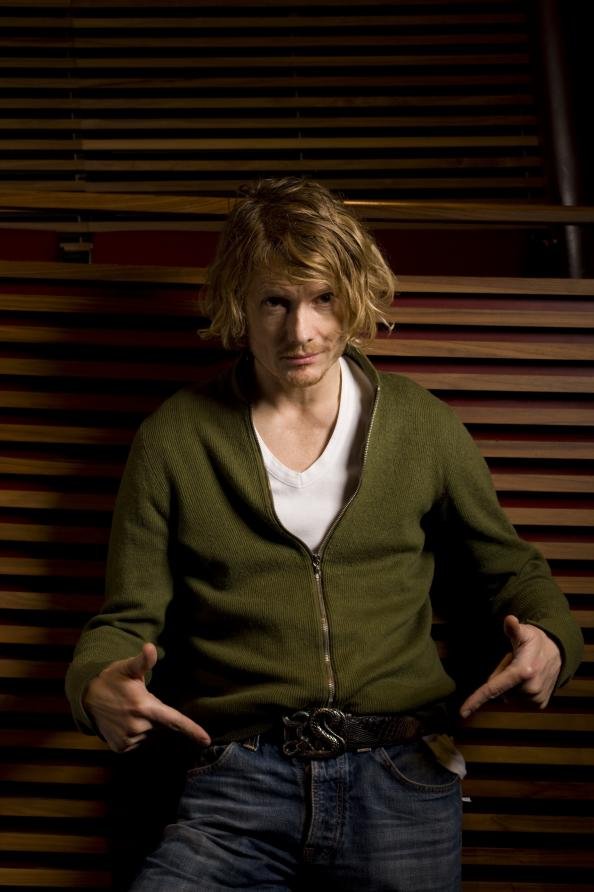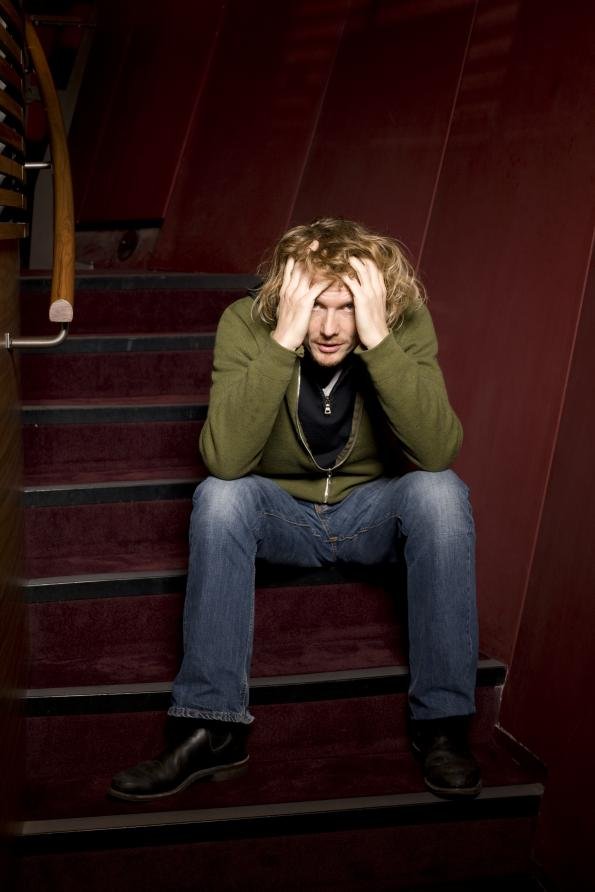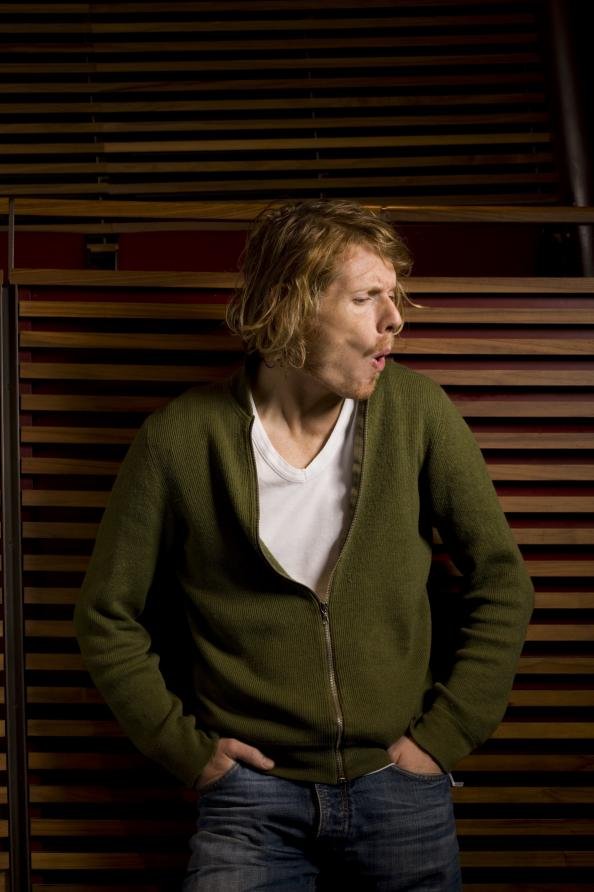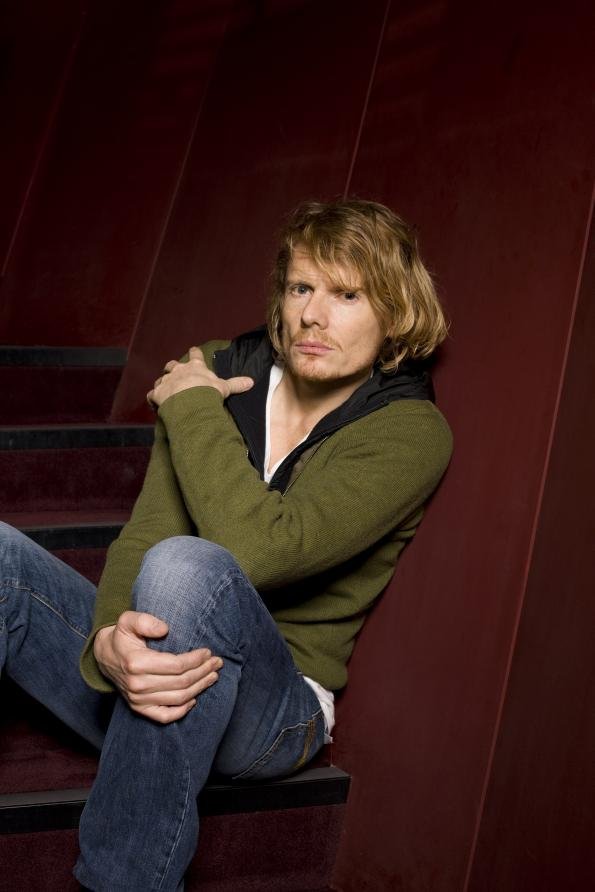
 |
Grove Magazine, January 2010Julian Rhind-Tutt: In the Wings Natasha Paulini finds Green Wing's motorbike riding Dr 'Mac' MaCartney, Julian Rhind-Tutt, ghost hunting at Hampstead Theatre Interview: Natasha Paulini,
This isn’t the 41-year-old’s first foray into the world of the supernatural. The actor was a member of the dead royalty society in Stardust and played a 17th century sceptic in Crooked House, written by good friend Mark Gatiss, who was also billed to co-star in Darker Shores. (Unfortunately, a serious family illness forced Gatiss to pull out just before opening night.) Rhind-Tutt plays American spiritualist, Tom Beauregard, enlisted to help find the ghost that haunts The Sea House, an old childhood home on the desolate Sussex coast. “Mark is the master of spookiness,” says Rhind-Tutt. “I’m the friend to the spook-masters, Mark and Mike Punter, who wrote Darker Shores. I’ve also just done an episode of Poirot. I’m a ne’er-do-well gardener who may or may not be involved in evil deeds surrounding a Halloween party. The script is written by Mark. Basically I only get jobs because my mates give them to me.” Rhind-Tutt finds it easy to extol the brilliance of others – less vocal is he about any relating to himself. Most questions touching on the actor’s considerable talent are batted away with more than a little self-deprecation. You get the feeling that his ambitions are few, yet with films under his belt like Notting Hill, Tomb Raider and Stardust, it can’t all be good luck. “I have done many lines in blockbuster films. Obviously they’re great fun – let’s talk about money, let’s talk about people holding an umbrella over your head. Well, I was inside for Stardust. But they would’ve done if it rained…” The dry humour has stood Rhind-Tutt in good stead throughout his tenure as the fop-haired, wise-cracking heartthrob Dr ‘Mac’ MaCartney in Green Wing. The role came up just as he had decided to give up television. “I didn’t really want to do another comedy series,” he says. “But the people doing it were very, very nice; a lady called Victoria Pile was the producer, and we all got on really well. We just sat in a church hall, messed around and thought it was funny. Nobody knows whether a comedy is going to be any good; the chemistry was just right.”
Rhind-Tutt’s career started with nothing so clichéd as a “calling; no dressing-up boxes when I was a child”. The youngest of five children with “I remember thinking how boring Little Venice was, but now it’s kind of all right,” he says. “Porridge on Lauderdale Parade does an excellent full English. I like banging my head on the small bar area in the Prince Alfred. When I come round, I might have lunch at Osteria Basilico, or go to the gym at Paddington Rec, to complete the utterly pretentious picture of a twatty unemployed actor.” Rhind-Tutt’s first taste of the career he talks about with tongue so firmly in cheek was the lead in The Happy King in primary school – “it was all downhill from there” – followed by his Middlesex school production of Hamlet that was taken to the Edinburgh festival. Rhind-Tutt meandered along afterwards, not quite knowing what to do with this thing called acting. The sensible advice came to go to college, Warwick University, where the actor he did English and theatre studies. “I had a couple of mates there; we didn’t really know what we were doing,” the actor shrugs. “You know when you don’t understand where you are in life or what happens next? I always think it’s like driving a car from the passenger seat – you’re just not really quite sure what’s going on. So we were like, ‘How do we carry on doing that and not get a job?’ Oh, you have to be an actor. And for that we probably have to go to drama school. In London.”
Rhind-Tutt’s time in radio landed him his first big break, The Madness of King George III with Nigel Hawthorne. The play went from stage to film, Rhind-Tutt reprising his role as the Duke of York. This draws the comparison, stage or screen? “It’s what you can get,” says Rhind-Tutt. “If somebody offered me lots of big blockbuster movies, I would do them and be extremely pleased. But even then, you can have too much of a good thing. Possibly. A feeling perhaps I may never know.” Then parodying himself: “You know what, I’m really fed up with these big blockbuster movies, and want to come back to the theatre.” As so many actors do: Christian Slater showed his ugly side in Swimming with Sharks, Kevin Spacey argued evolution in Inherit the Wind, “Obviously with a heavy warning of ‘wank’, shall we say, there is a gem of truth in the fact that you can’t beat telling a complete story in one evening,” he says. “These big posh film actors that do theatre – it is a very different craft. It’s almost like a talent you can’t put down. If you’re just talking about getting by, just getting through, it’s a lot easier to get through on TV and film. To actually stand on that stage and appear to have an intimate conversation with someone, yet have someone in the back row hear you completely clearly is a technical challenge that will always be more difficult and, ultimately, rewarding. That’s why people do it.” The self-deprecation is never far away, but there is a deep, bright vein of passion for his craft. One that’s no doubt had much to do with the actor’s success – whether he admits it or not.
|












 Despite citing himself as someone that doesn’t really ‘do’ comedy – “I just do things that sometimes have funny lines in them” – those “very, very nice” people were the cream of British comedy: Stephen Mangan, Tamsin Greig and Mark Heap, together with Pile, she of the Emmy award-winning brilliant sketch comedy, Smack the Pony.
Despite citing himself as someone that doesn’t really ‘do’ comedy – “I just do things that sometimes have funny lines in them” – those “very, very nice” people were the cream of British comedy: Stephen Mangan, Tamsin Greig and Mark Heap, together with Pile, she of the Emmy award-winning brilliant sketch comedy, Smack the Pony. So Rhind-Tutt did just that, studying at the Central School of Speech and Drama, and winning the coveted Carleton Hobbs Award in the process “for talking shit on the radio”. The prize was nine-month contract with the BBC Radio Drama Company, where the actor had the opportunity to work with such theatre and film greats as Jon Pertwee, Richard E Grant and Brian Cox.
So Rhind-Tutt did just that, studying at the Central School of Speech and Drama, and winning the coveted Carleton Hobbs Award in the process “for talking shit on the radio”. The prize was nine-month contract with the BBC Radio Drama Company, where the actor had the opportunity to work with such theatre and film greats as Jon Pertwee, Richard E Grant and Brian Cox.
